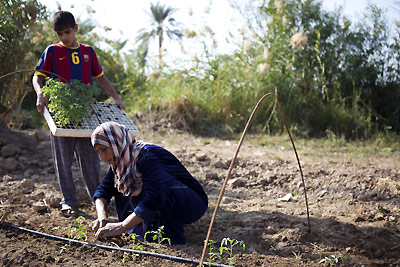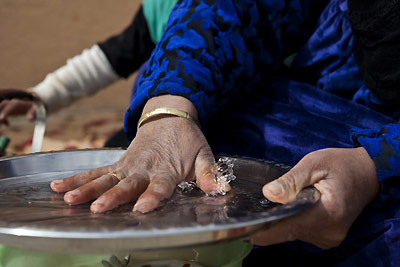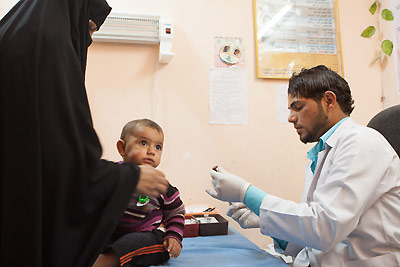Iraq: The ICRC’s humanitarian activities in 2013
Throughout 2013, the ICRC pursued its humanitarian activities on behalf of the people of Iraq, as it has been doing continuously since 1980. By doing so, the organization continued to assist and give a voice to those most in need, based solely on humanitarian grounds.
During the past year, the Iraqi people continued to carry the humanitarian burden of decades of conflict and ongoing violence, dating back to the outbreak of the Iran-Iraq war in 1980. Access to basic necessities, such as clean water and proper health care, remained a challenge for many, especially those in rural and violence-prone areas.
In 2013, the ICRC further extended its presence in areas most affected by the past and present violence. This was most notable in the disputed territories and in central Iraq, where it increased its proximity to those Iraqis in need of assistance and altogether broadening the scope of its humanitarian activities. Those who received help included vulnerable people and communities, in particular women heading households, those living with a disability, needy farmers, internally displaced people and refugees.
The organization focused on strengthening health and physical rehabilitation services, improving access to clean water and responding to humanitarian emergencies. Supporting the Iraqi authorities in their efforts to ascertain the fate of missing people continued to be a priority for the ICRC, as was the monitoring of the conditions in which detainees are held and the treatment they receive.
To maintain its ability to assist those most in need, the ICRC remains in dialogue with all relevant stakeholders in the country, and also continues to work closely with the Iraqi Red Crescent Society to respond to the needs of violence-affected people. The organization works from its delegation in Baghdad and its 11 field offices in Baghdad, Basra, Dohuk, Erbil, Khanaqin, Kirkuk, Mosul, Najaf, Nasiriya, Ramadi and Sulaimaniyah. The ICRC delegation in Iraq employs some 817 staff, including 728 Iraqi nationals.
In 2013 the ICRC:
Relief

- distributed food to more than 10,000 people in need and provided other basic household necessities such as blankets, jerry cans, buckets, hand towels and hygiene items, stove and kitchen sets, thermoses and tarpaulins to over 22,000 people;
- assisted 23,000 farmers in the violence-prone areas with seeds, fertilizers, tools, drip irrigation systems, and greenhouses;
- supported some 34,000 people in the most vulnerable places through rehabilitation of irrigation canals and cash-for-work services;
- provided 3,300 of the most vulnerable widows with small grants to access social welfare benefits;
- helped 4,500 of the most vulnerable female-headed households and people with disabilities establish their own small businesses;
- distributed food and essential household items to 9,000 Syrian refugees, of which more than 5,500 received two rounds of such assistance.
Water

- provided nearly 700,000 people in the most remote areas prone to violence with clean potable water;
- rehabilitated and improved water and sanitation installations for more than 106,000 people who fled their homes as a result of internal waves of violence;
- improved the living conditions of over 2,000 detainees by upgrading water supplies, ventilation systems and recreation areas in three places of detention;
- trained 24 staff on how to operate compact water treatment plants.
Health

- provided on-the-job training to staff and worked to enhance mother and child care, infection control, hygiene and waste management, pharmacy management skills and referral systems in 13 primary health centres in the most remote areas. As a result, 400,000 people benefited from improved access to primary health-care services;
- built two primary health centres, rehabilitated three others and provided three additional health-care facilities with spare parts for their mortuary fridges in the most violence-prone areas;
- improved the capacities of two hospitals in Hilla and Baghdad to provide essential emergency surgical services;
- provided nearly 33,000 patients with physical rehabilitation materials and services in ten ICRC-supported and one ICRC-operated physical rehabilitation centres. These centres continue to be supported with training and raw materials to manufacture equipment such as prostheses, crutches and wheelchairs.
Detention and restoring family links

- visited almost 40,000 people in over 70 places of detention run by the Iraqi Central and Kurdish Regional governments – including visiting and monitoring 600 individual detainees – undertaking a variety of activities to ensure appropriate living conditions and treatment;
- provided nearly 17,000 of the most vulnerable detainees with basic necessities such as clothes, hygiene items, blankets and other day-to-day essentials;
- helped more than 100 family members to visit loved ones held in detention;
- facilitated numerous contacts between detainees and relatives through the Red Cross Message service;
- facilitated free three-minute phone calls to any destination worldwide for 500 Syrians in Al Qaim and Al Obeidi refugee camps.
- http://www.icrc.org/eng/resources/documents/fact-figures/iraq-facts-and-figures.htm
